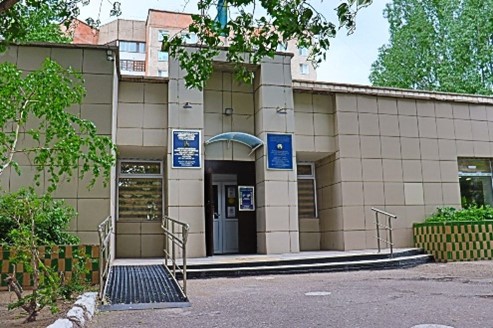
The history of creation.In 1970, on the basis of Library No. 7.A special library for blind and visually impaired citizens was opened in Pavlodar.
The library was located at the educational and production enterprise of the Kazakh Society of the Blind (UPP KOS). The foundation of the book fund was the fund of library No. 7, and the basis of the book fund of special literature were books of relief-dot format (RTS), which were donated from the SCP KOS.
Since 1972, the library has been equipped with a "talking book" on rolls. Librarians, along with readers, rejoiced at the appearance of the first tape recorders of talking books.
In order to bring the book closer to the place of residence of the visually impaired, they began to develop non-stationary forms of service. Correspondence and home-based subscriptions began to work.
In 1970, the first issuing point was opened at the Ekibastuz territorial primary organization of the CBS. In 1973 – at Ermakovskaya (now Aksu).
To date, there are 17 library points in the region, of which 12 are in the districts and 5 in the city. Remaining the guarantor of the protection of the information rights of the visually impaired, the library serves the disabled of other categories and pensioners.
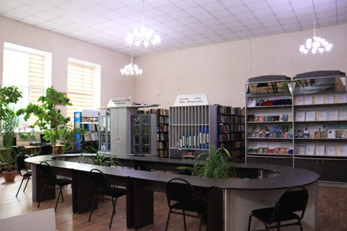
In 1990, the library moved to a new spacious room with a reading room for 30 people: a book depository for Braille literature. The library staff has expanded and the book collection has increased.
A special library is a unique book depository of information on various media: books in relief–dot font, voiced books on electronic media.
Over the years, the library has turned into a rehabilitation, typhoid information, methodological, socio-cultural center for working not only with visually impaired people, but also other socially vulnerable groups of the population.
Priority areas in the library's work are ensuring equal access to information for people with disabilities and creating conditions for their social rehabilitation and integration into society.
In 2006, an office for teaching computer literacy, writing and reading in the Braille system was opened. The office is equipped with modern typhoon equipment. A blind user has the opportunity to freely access the Internet and typhoon equipment, print out the text in enlarged font or Braille.
Since 2017, the library has been actively cooperating with cultural, social protection, educational organizations, non-governmental and public organizations of the Pavlodar region and with neighbors of the near abroad.
In 2018, one of the first in the country, among the special libraries, opened a coworking center, where all conditions are created for comfortable rest of readers, presentations and meetings.
In 2018, the project of the recording studio "Zhan alauy" was implemented on the basis of the library. To date, the studio is actively working and implementing a number of projects to create audiobooks.
In 2021, together with RTRK Ertis, they launched the Keremet Zhandar social project. This program acts as a creative platform for creative people with disabilities.
In 2021, the special library became the winner of the republican contest "Rukhani Kazyna-2021" in the nomination "The best state library for blind and visually impaired citizens".
The total fund is 73699 copies, per state.in the language of 13961 copies .
The book fund amounted to 69834, per state.language 11404 copies .
S.Toraighyrov Pavlodar Regional Universal Scientific Library
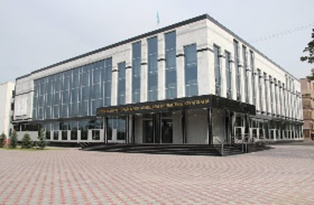
The history of the Pavlodar Regional Library dates back to the end of the nineteenth century, when Pavlodar was a part of Semipalatinsk province as a county seat. Merchants, consisting of more than a hundred people, played a major role in the development of Pavlodar. Among them: A.I. Derov, A.I. Sorokin, Niyaz Aitykin and his sons, V.A. Agafonov and others. The first cultural institution in the town was the public library.
The biography of the oldest library in the region began in 1892, when, by decision of the City Duma and with donations from the merchant of the 1st guild Artemy Derov and other local patrons, the "city public library with a free reading room located in its own house" was opened. Funds for the formation of the foundation and its organization were collected at charity events.
The library was located in the building of the Noble Public Assembly on Meshchansky Lane No. 3 (now M.Isinalieva Street). At the opening, the Charter regulating the activities of the library was adopted.
Since 1896, the library was called the county library, and this date later became fundamental for determining the age and celebrating anniversaries of the regional library. The collection of the county library at that time numbered 5,475 copies of books and magazines. The meager city budget could not meet the library's needs for new books.
A new stage in the history of the Pavlodar County Library began in 1920, after the adoption of the decree "On the centralization of librarianship in the RSFSR". The library was transferred to budgetary financing, which allowed it to replenish its fund and complete 10 books with a fund of 3,500 copies.
In addition to the district library, there were libraries in Pavlodar at the Workers' Club, clubs of Water Workers and Railway workers. In 1925, the listed libraries, headed by the county library, formed a library association.
Since 1929, the library has become a district library, since 1932 - a district library.
In 1938, in connection with the formation of the Pavlodar region, the library received the status of a regional library.
During the Great Patriotic War, the building where the library was located was occupied as a hospital.
In 1948, the library was allocated the premises of the former merchant Tumashev's house, built in the first decade of the twentieth century. The main library of the region has been located in this old one-story house, which is an interesting architectural monument, for almost fifty years.
In 1951, for the first time, a plan was developed to provide methodological assistance to district and city libraries, and a seminar was held for city, departmental, school and party libraries. Library apprenticeship courses were organized at the library before the opening of the Aksu College.
In 1988, by order of the Ministry of Culture of the Kazakh SSR, the Pavlodar regional universal, youth and children's libraries were the first in the republic to unite and become the largest regional united universal scientific library in the region.
In 1996, in connection with the 100th anniversary, the building of the House of Political Education was allocated for the library. In the same year, the regional library was named after the outstanding Kazakh poet Sultanmakhmut Toraighyrov.
Since 1993, the regional library has been mastering new technologies. 1 computer was purchased, an ABIS program, the creation of an EC. 1996 - a local network was created, 1997-1998 - Internet, e-mail, 1999 - the first library website. 2000 - creation of an ARM for librarians, 2001 - RABIS, reader's access to EC.
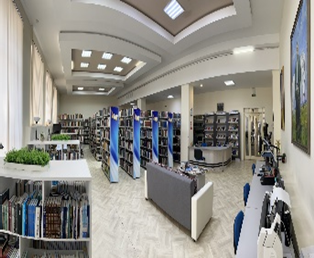
The Regional Library, one of the first in the republic, began work on the development of projects and the submission of applications for grants. From 1997 to 1999, the library received grants from the Soros-Kazakhstan Foundation and the Open Society Institute for the implementation of projects: "Internet. E-mail", "Model library of the region", "Zhanashyr". They made it possible to lay the foundation for the library's computer park, integrate it into a local network, provide users with access to the Internet, an electronic catalog and a website. Participation in the megaproject "Pushkin Library" has replenished the fund with a significant amount of literature from the best Russian publishers, as well as electronic media in the form of CDs and CD-ROMs.
In 1998, the library became a member of the Library Association of the Republic of Kazakhstan, in 2002 - a member of the Information Consortium of Libraries of Kazakhstan. In 2003, in Pavlodar, recognized by the results of the competition as the Library Capital of Kazakhstan, the republican conference "A new library for a new information community" was held on the basis of the regional library. Model rural Library". The event of the forum was the presentation of the first model rural library of Kazakhstan (Orlovka village) using advanced information technologies.
In 2004, for the first time in the republic, the regional program "Auyl Kitaphanasy" for 2004-2006 was adopted, developed by the S.Toraighyrov Regional Library. Since its adoption, 61 rural libraries have been opened. All central district, city and model rural libraries have been computerized.
Since 2006, the library has been digitizing rare and especially valuable publications on the cultural heritage of the Pavlodar region. The objects of digitization are valuable local history publications, including works by Pavlodar authors S.Dzhaksybaev, B.Khazyrov E.Sokolkina, Bayazitova, etc.
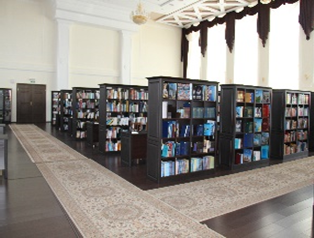
Since 2005, the official website of the regional library has been available on the Internet - www.pavlodarounb .kz, a new version of the site was launched in 2018 - www.pavlodarlibrary.kz .
In 2014, the regional library opened its doors after major repairs. Today, the library is designed in such a way that every reader can immerse himself in his space: take a seat in an armchair, walk around the hall with a book or sit in a specially designated place for reading. The new "book temple" combines electronic resources and a classic book.
The centers for servicing readers with disabilities "Zhanashyr" have been opened. This is a modern complex for servicing special readers: a typhoid complex, a "Reading machine", a mini trackball (ergonomic manipulator), a printer and a computer working with Braille. If necessary, the reader can save his text with his own voice. Communication acoustic systems for the hard of hearing have been installed.
The main innovation in servicing library readers after major repairs is the introduction of the principle of open access for readers both in reading rooms and on subscription. The subscription welcomed visitors with a new interior, open access to more than 100 thousand books. The reading room of electronic publications has 32 seats, 4 readers can study individually at once at a round table, 16 computers with modern computers, high-speed Internet and WI-FI. The Toraighyrov Hall has been opened, which contains literature about the poet and his works. Events promoting the cultural heritage of the Pavlodar region are also held here, confirming the status of the library as a center of spiritual life, using the library as a meeting place with local historians, public figures, and other prominent people of the city.
In 2014, RFID technology was introduced, a modern solution for automating library processes, raising the quality of user service to a new level.
The library has a local history podcast channel "PRO Pavlodar", a children's reading center named after the Pavlodar writer Suleyman Bayazitov
The Rare Book Hall was opened in 2014 and has over 3,000 copies of books. There are 5 collections in the hall: editions of the late XIX – mid XX century; Kazakh printing; facsimile and reprint editions; miniatures; autographed books.
The oldest book in the library collection is the book by the English philosopher John Toland "The Nazarene, or Christianity of Jews, Pagans and Mohammedans", published in 1777 in Paris.
The collection "Editions of the late XIX– early XX centuries". It contains lifetime editions by V.G. Korolenko, A.F. Pisemsky, Ya. Polonsky, etc. Encyclopedic publications are widely represented in this collection: the Brockhaus and Efron Encyclopedic Dictionary (1890-1906), the Garnet Brothers Encyclopedic Dictionary, etc.
The earliest Kazakh edition is the Agricultural Survey of the Semipalatinsk region for 1915, printed in the Semipalatinsk electro-printing house in 1917.
There is an edition of F.M. Dostoevsky's "Poor People" in the state language, typed in Latin graphics: Dostoejebskij P.M. Bejcaralar. – Almaty, 1935. Also M. Dulatova's "Task Book" in Arabic, published in Orenburg in 1925, etc.
The collection of "Facsimile and reprint editions" includes more than a hundred copies: "Izbornik Svyatoslav" 1073, "The Legend of Boris and Gleb", "Codex Cumanicus", "Korkyt Ata Kitaby", etc.
The library houses collections from the personal libraries of Grigory Osipyan, Ramazan Tokhtarov, Galiya Baltabai.
The collection of rare books by the literary critic, composer, and musicologist Nahum Grigoryevich Shafer includes 173 editions of books. The gems of the collection are the "Desktop Dictionary for reference in all branches of knowledge" (1864), Vigel F. F. Memoirs (1865), etc., as well as periodicals, among them the magazine "Alarm Clock" (1899), etc.
The total fund is 542,786 copies; per kaz. yaz. – 109 376




